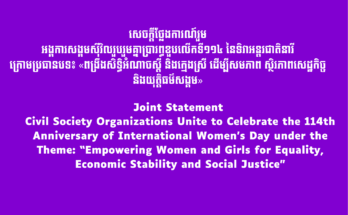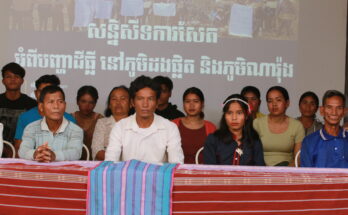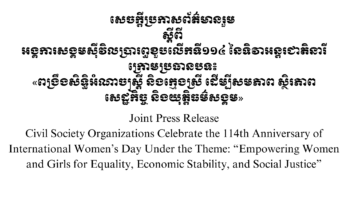JOINT MEDIA STATEMENT
Civil Society Expresses Concern over Recent Developments in the
Extraordinary Chambers in the Courts of Cambodia, and Urges the International Community to Speak Out
Phnom Penh, 19 May 2011
We, the undersigned members of civil society, are deeply concerned over recent developments at the Extraordinary Chambers in the Courts of Cambodia (ECCC) in relation to the ongoing prosecution and investigations in Cases 003 and 004. We are concerned that the mandate of the court – to bring to trial senior leaders and those most responsible for Khmer Rouge atrocities – is at risk of not being genuinely carried out.
We urge all stakeholders – victims of Khmer Rouge atrocities, donors, the Cambodian government, and the United Nations – to ensure that justice is done and is seen to be done by the ECCC.
We urge all those concerned to ensure that the goal of the ECCC is carried out and the overall legacy of the ECCC is serving as a model for rule of law development in Cambodia.
All ECCC judges – whether Cambodian or international – are required to be persons of high moral character, to possess a spirit of impartiality and integrity, and to be fully independent in the performance of their functions. They are prohibited from accepting or seeking any instructions from any government or any other source. The ECCC’s Co-Prosecutors are subject to the same standards. The recent developments at the ECCC pertaining to Cases 003 and 004 compounds our grave concerns that the impartiality, integrity, and the independence of ECCC judges are being tainted.
Cambodians have a right to know what happened at the hands of the Khmer Rouge. Within this “right to know” implies access to the truth about what happened during the Khmer Rouge era. One of the functions being fulfilled by the ECCC is to create an historical record about what happened. It is imperative that this record is as complete and accurate as possible. The ECCC must safeguard against any creation of negationist or revisionist records about what happened.
Cambodians have a right to justice. This includes the right of victims to meaningful participation in the justice process – at all stages of the proceedings. In order to effectively exercise this right, all Cambodians need access to publicly available information. Ample information can be provided to victims while safeguarding the rights of those alleged to have perpetrated Khmer Rouge atrocities according to the highest international standards. International Co-Prosecutor, Andrew Cayley, provided some basic factual information about Case 003 in his press statement of 9 May 2011. However, this information was not timely enough for civil society to effectively carry out its functions in respect of victim participation. Cambodian civil society urgently requires additional information and time in order to be able to effectively represent the interests of the Cambodian people in Cases 003 and 004.
We, the undersigned, remain hopeful of the promise the ECCC holds in setting and maintaining standards for rule of law development in Cambodia. The rule of law, democracy, the principle of separation of powers and the independence and impartiality of judges are interconnected. For Cambodians, therefore, it is absolutely imperative that the ECCC – a court within the domestic justice system, and applying both Cambodian and international law – serves as a real role model for the future.
We urge all concerned individuals and groups to take appropriate action to ensure that the Case 003 and 004 investigations are full and genuine; to ensure that an accurate historical record is created by the ECCC; to ensure that Cambodians have access to justice, and to the truth about Khmer Rouge atrocities; and to ensure that the right of victims to meaningful participation in the proceedings is effectively guaranteed.
Below are the names of NGOs and Associations supporting the Joint Media Statement:
1. Cambodian Human Rights and Development Association (“ADHOC”)
2. Cambodian Defenders’ Project (“CDP”)
3. Khmer Institute of Democracy (“KID”)
4. Khmer Youth Association (“KYA”)
5. Cambodian Women in Crisis Center (“CWCC”)
6. Legal Aid of Cambodia (“LAC”)
7. Coordination of Action Research on AIDS and Mobility (“CARAM Cambodia”)
8. Cambodian Center for Protection of Children’s Rights (“CCPCR”)
9. Cambodian Health and Human Rights Alliance (“CHHRA”)
10. Cham Khmer Islam Human Rights and Development Association (“CKIMHRDA”)
11. Mission of Generous Cambodian Alliance (“GENEROUS”)
12. Human Rights Organization for Transparency and Peace (“HROTP”)
13. Indradevi Association (“IDA”)
14. Khmer Institute for National Development (“KIND”)
15. Khmer Kampuchea Krom Human Rights Association (“KKKHRA”)
16. Khmer Kampuchea Krom Human Rights and Development Association (“KKKHRDA”)
17. People’s Center for Development and Peace (“PDP”)
18. Protection of Juvenile Justice (“PJJ”)
19. Human Rights Vigilance of Cambodia (“VIGILANCE”)
20. Center for Social Development (“CSD”)
21. Center for Justice and Reconciliation (“CJR”)
22. Building Voices of Community (“BCV”)
23. Khmer Students Association (“KSA”)
24. Cambodia Justice Initiative (“CJI”)
25. Cambodian Center for Human Rights (“CCHR”)
26. Youth for Peace (“YfP”)
27. Youth Resource Development Program (“YRDP”)
28. International Center for Conciliation-Cambodia (“ICfC”)
29. Cambodian League for the Promotion and Defense of Human Rights (“LICADHO”)
30. Fine Arts Association (“FAA”)
31. Cambodian Human Rights Action Committee (“CHRAC”)
32. Committee for Free and Fair Elections in Cambodia (“COMFREL”)
33. Neutral and Impartial Committee for Free and Fair Elections in Cambodia (“NICFEC”)
34. Star Kampuchea
35. Secretariat of Housing Rights Task Force (HRTF)



